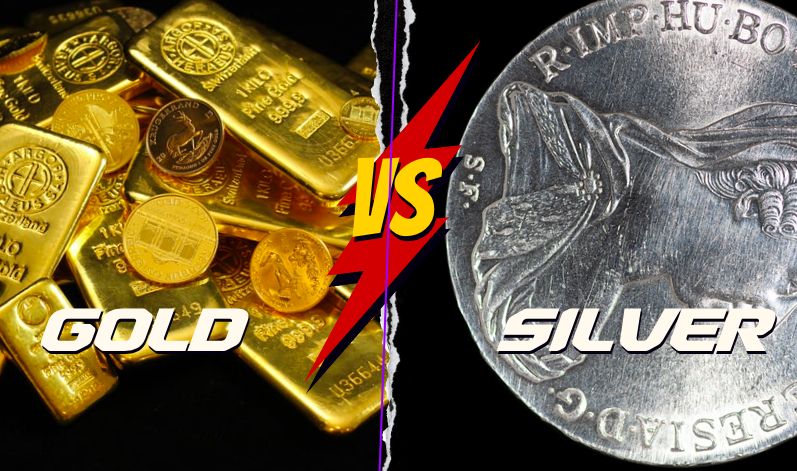Do your parents also debate over where they should invest? He is in the Favor of gold, whereas she is in the silver’s side. Most of the people consider gold as one of the first choice while investing, but there is a percentage of people, whom first preference is not a gold but is silver. There is a quote that fits on this long-standing debate topic by Warren Buffett, “Gold is a way of going long on fear. Silver is a way of going long on fear and greed.” With that in mind, let’s begin.
The long-standing debate about which is the better investment, gold or silver, has been going on for years. Both precious metals have their advantages and disadvantages, and it is ultimately up to the individual investor to decide which one is better for them. In this article, we will explore the pros and cons of both gold and silver investments and delve into the current market trends to help you make an informed decision.
First, let’s discuss about some features of gold and silver and then dive into advantages and Disadvantages of Investing into these precious metals.
Overview of Gold and Silver
Gold and silver are two of the most popular precious metals used as investments. Each one has distinct advantages and disadvantages that should be carefully considered before investing. Gold is typically viewed as the safer option due to its stability and long-term value, while silver is often seen as more speculative and volatile. Both gold and silver have a history of being used as currency, and both have experienced periods of high demand. Investing in either of these metals can be a sound decision for those looking for a safe store of value.
Pros and Cons of Investing in Gold
Pros of Investing in Gold:
- Gold is a tangible asset, meaning it can be held in physical form. This makes it an excellent hedge against inflation and a secure store of value.
- Gold is a globally accepted currency, making it easy to liquidate in any currency.
- Gold is a relatively stable asset, making it a safe investment.
- Gold is a form of diversification, since it doesn’t move in tandem with the stock market.
Cons of Investing in Gold:
- Gold doesn’t pay dividends, making it an inefficient form of income.
- Gold is a volatile asset, meaning its price can fluctuate significantly in a short period of time.
- Gold is subject to the whims of the market, which can cause its price to drop significantly.
- Gold requires storage, which can be expensive and inconvenient.
Pros and Cons of Investing in Silver
Pros of Investing in Silver:
- Silver is more affordable than gold, making it easier for new investors to get into the market.
- Silver has a lower correlation to other assets, making it a good portfolio diversifier.
- Silver is a tangible asset that can be stored and retrieved at any time.
- Silver prices tend to be more volatile than gold, giving investors the potential for greater gains.
- Silver is used in many industrial applications, so its price can benefit from increased demand.
Cons of Investing in Silver:
- Silver prices can be more volatile than gold, meaning that investors can incur greater losses.
- Silver is sometimes seen as a speculative asset, making it less attractive to conservative investors.
- Silver is not as widely accepted as a form of currency as gold, so it may not be as liquid.
- Silver is subject to manipulation by speculators and is therefore more difficult to accurately predict.
- Silver production is limited, meaning that its potential for appreciation is not as great as gold.
Comparing Returns on Investment
Comparing Returns on Investment Investing in gold and silver is a popular way to diversify and protect your portfolio, however, it’s important to consider which of these two precious metals will give you the best returns on your investment. When it comes to returns, gold is generally considered to be the more reliable of the two. While the price of gold can fluctuate, over the long-term it has consistently increased in value, making it a safe option for investing. The returns on gold investments are typically higher than those on silver, meaning that gold is often the preferred choice for investors looking for the maximum return on their investment. In contrast, silver is often seen as a more volatile commodity, with prices fluctuating more quickly than gold. This means that the returns on silver investments can be significantly higher than those on gold, but it also means that the risk is much greater. Silver is often chosen by investors who are looking for a higher risk/higher reward option. Ultimately, the choice between gold and silver as an investment comes down to personal preference. Those who are looking for more stable returns may prefer to invest in gold, while those who are looking for higher returns may opt for silver.
Now, let’s discuss how it will be beneficial for us to invest in these metals.
Advantages of Investing in Gold vs Silver
Gold
- Gold is a safe-haven asset, meaning that it tends to rise in value during times of economic turmoil and uncertainty.
- Gold is a tangible asset, meaning it has an intrinsic value that isn’t subject to the whims of the markets or the economy.
- Gold has been seen as a store of wealth for thousands of years and is widely accepted as a form of payment across the globe.
- Gold has an unparalleled liquidity, meaning it can be bought and sold easily.
Silver
- Silver is more affordable than gold, making it a more accessible investment for many people.
- Silver has a variety of industrial uses and is in high demand for electronics, medical equipment, and other products.
- Silver tends to rise in value during times of economic growth and market optimism.
- Silver has a higher liquidity than gold, meaning it can be bought and sold more quickly in a pinch.
Disadvantages of Investing in Gold vs Silver
1. Volatility: Gold and silver prices have been known to fluctuate significantly, making them high-risk investments.
2. Liquidity: Gold and silver are not as liquid as other investments such as stocks, bonds, and real estate. It can be difficult to liquidate large chunks of these metals quickly.
3. Storage Costs: Storing gold and silver can be expensive. If investors don’t use the services of a third-party storage facility, they’ll have to store the metals themselves, which can be costly.
4. Counterparty Risk: Investing in gold and silver through third-party custodians and dealers carries counterparty risk, meaning that if the custodian or dealer goes bankrupt, investors may not be able to reclaim their investments.
5. Taxes: Gold and silver investments may be subject to capital gains taxes, making them potentially less profitable than other investments.
FAQ
What is the difference between investing in gold vs silver?
Gold is typically more expensive and has more intrinsic value than silver. Gold is also better known and more widely accepted as a store of value while silver is more accessible and may be more liquid.
What are the advantages of investing in gold?
Gold is seen as a safe-haven asset, meaning it tends to increase in value during times of economic uncertainty and can act as a hedge against inflation. Gold is also more durable and easier to store than other investments such as stocks and bonds.
What are the advantages of investing in silver?
Silver is more accessible and liquid than gold, meaning it can be bought and sold more easily and quickly. Silver is also more volatile than gold, meaning it can provide greater potential for short-term gains.
What is the best way to buy gold or silver?
Investors can buy gold and silver through a variety of methods including coins, bars, and ETFs. It is important to research the different methods and choose the one that best meets your investment goals.
What is the best way to store gold or silver?
Gold and silver should be stored in a safe and secure location such as a bank safe deposit box or a safe. Gold and silver can also be stored in a vault or with a third-party storage provider.
What are the risks associated with investing in gold or silver?
The price of gold and silver can be volatile and may fluctuate significantly, meaning investors may experience losses. There is also the risk of theft or fraud when investing in gold or silver.
How long should an investor hold gold or silver?
The length of time an investor should hold gold or silver depends on their investment goals and risk tolerance. Some investors may hold gold or silver for the long-term while others may take a more short-term approach.
What is the best way to diversify an investment portfolio with gold or silver?
Investors can diversify their portfolio with gold or silver by investing in a wide range of products such as coins, bars, ETFs, and mutual funds. It is also important to consider the amount of gold or silver to invest in relative to other assets in the portfolio.
Conclusion
There is no one-size-fits-all answer to the question of which is a better investment, gold or silver. It ultimately depends on the individual investor’s goals, risk tolerance, and financial situation. Those who are looking for a safe haven and are not as concerned with potential returns may be better off investing in gold. On the other hand, those who are willing to take on higher risk and seek higher returns may be better off investing in silver. In any case, it is always important to research, plan, and diversify investments to ensure the best possible outcome.







